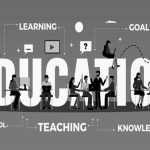Education is the cornerstone of progress, a catalyst for personal and societal development. From the early stages of childhood learning to the pursuit of higher education and lifelong learning, the impact of education is far-reaching. This article explores the multifaceted nature of education, its role in shaping individuals and societies, and the evolving landscape of learning in the 21st century.
1. The Foundation: Early Childhood Education:
The journey of education often begins in the formative years of early childhood. Early childhood education lays the groundwork for cognitive, social, and emotional development. Research consistently shows that quality early education programs contribute to better academic outcomes, improved social skills, and a solid foundation for future learning.
Investing in early childhood education is not just an investment in individual futures but a societal investment with long-term benefits. Countries with robust early education systems often see higher levels of academic achievement, reduced inequality, and increased economic productivity.
2. Primary and Secondary Education:
As students progress through primary and secondary education, they encounter a broad curriculum designed to foster critical thinking, problem-solving skills, and a well-rounded knowledge base. This phase of education not only equips individuals with fundamental skills but also plays a crucial role in shaping their worldview and values.
The quality of primary and secondary education is a key determinant of a nation’s future. Countries that prioritize accessible and high-quality education at this level tend to have more informed citizens, a skilled workforce, and greater social cohesion.
3. Higher Education: Unlocking Opportunities:
The pursuit of higher education opens doors to a world of opportunities. Whether through universities, colleges, or vocational training programs, higher education allows individuals to specialize in their chosen fields, acquire advanced skills, and engage in critical research. Beyond the acquisition of knowledge, higher education fosters a spirit of inquiry, innovation, and a lifelong love of learning.
In today’s globalized economy, higher education is often seen as a pathway to increased employability and career advancement. The emphasis on specialized skills in fields such as science, technology, engineering, and mathematics (STEM) reflects the evolving demands of the job market.
4. Lifelong Learning in the 21st Century:
In the fast-paced and ever-changing landscape of the 21st century, the concept of education extends beyond formal institutions. Lifelong learning has become a necessity as individuals adapt to new technologies, industries, and societal changes. Continuous learning not only enhances professional development but also contributes to personal growth and fulfillment.
Online learning platforms, professional development courses, and skill-specific workshops provide avenues for individuals to upskill and reskill throughout their lives. The ability to learn continuously is a valuable asset in a world where adaptability and agility are essential for success.
5. The Digital Transformation of Education:
The advent of digital technology has brought about a revolution in education. Online learning platforms, virtual classrooms, and educational apps have democratized access to information and learning resources. The digital transformation of education has made it possible for individuals around the globe to pursue education at their own pace, breaking down geographical barriers.
While digital education offers unprecedented access, it also poses challenges, such as the digital divide and the need for digital literacy. Striking a balance between leveraging technology for educational purposes and addressing the disparities in access remains a critical consideration in the evolving landscape of education.
6. Education for Global Citizenship:
In an interconnected world, education plays a vital role in fostering global citizenship. Exposure to diverse perspectives, cultures, and ideas promotes tolerance, empathy, and a sense of shared responsibility for the well-being of the planet. Educational institutions that emphasize global awareness contribute to the development of individuals who can navigate the complexities of an interdependent world.
Conclusion:
Education is a powerful force that shapes individuals, societies, and the trajectory of human progress. From the early years of childhood learning to the pursuit of advanced degrees and continuous lifelong learning, education is a dynamic and transformative journey. By investing in accessible, high-quality education at all levels and embracing the opportunities presented by digital transformation, societies can empower individuals to reach their full potential and contribute meaningfully to the global community. In the words of Nelson Mandela, “Education is the most powerful weapon which you can use to change the world.”





